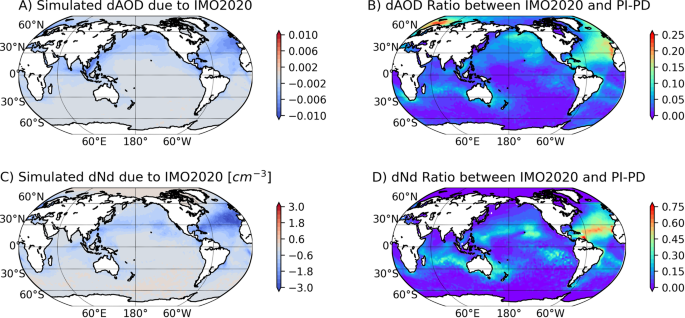A study recently published in Communications Earth and Environment has revealed that the sharp drop in sulphur dioxide emissions from ships may be warming the planet more than expected.
The research brought to light the debate on the consequences of an International Maritime Organization (IMO) regulation that has limited the amount of sulphur dioxide in ship emissions since 2020.
As New Scientist explains, while air pollution resulting from the burning of heavy marine fuel has been linked to tens of thousands of deaths a year, these aerosols also have a climate-cooling effect, directly reflecting solar radiation and influencing clouds over the ocean.


The researchers theorize that reducing these emissions results in warming due to the loss of the cooling effects of sulphur dioxide.
In the study, satellite data and mathematical models were used to analyze how the reduction in sulfur aerosols has influenced the climate.
It was found that the reduction in emissions may have increased the solar energy absorbed by the oceans by between 0.1 and 0.3 watts per square meter, a figure significantly higher than previous estimates.
This effect was particularly noticeable in the North Atlantic, a region that has recently experienced high temperatures.
The researchers expect the change to increase the average global temperature by around 0.16°C in the seven years following the implementation of the standard, effectively doubling the rate of warming during this period compared to previous decades.
Laura Wilcox, an expert at the University of Reading (UK), was skeptical of the study's projections, suggesting that the evidence presented does not justify the conclusions about temperature change.
“This is a timely study, but it makes very bold claims about temperature change and geoengineering that seem difficult to justify on the basis of this evidence,” he said.
According to New Scientist, the study was based on a simplified climate model that does not take into account the influence of the deep ocean.
In the same magazine, Zeke Hausfather, from Berkeley Earth, considered that this study confuses the influence of ocean warming with the warming of the entire planet, and that its “simplified climate model” showed a faster temperature increase than would actually occur:
“It is very difficult to justify a warming of more than 0.1°C in the short term using modern climate models,” explained the expert.






